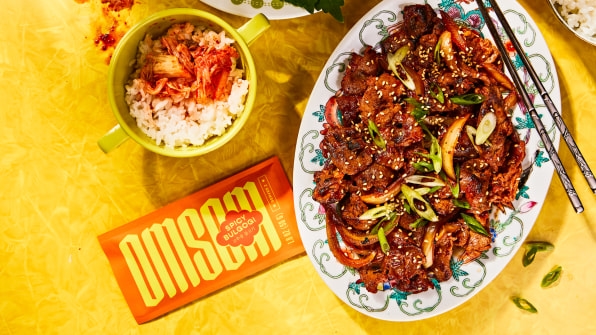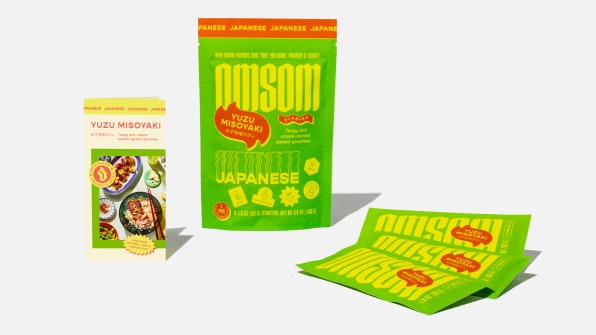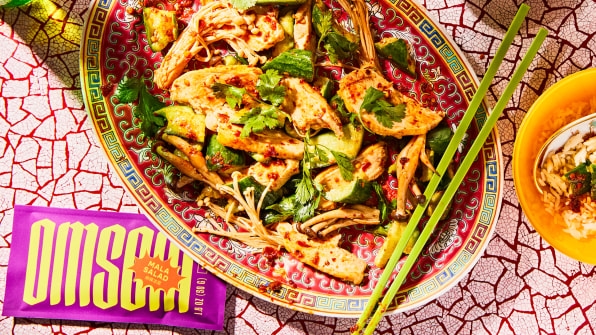Vanessa and Kim Pham want to take down the grocery store “ethnic aisle” with their Asian pantry brand, Omsom, a collection of delicious and delightfully branded sauces in ready-to-use packets. Their collection of tradition-inspired starters were developed to counter the “diluted and old-school” products found in their local grocery while they were growing up in Massachusetts.
Leaving corporate roles behind, Omsom’s founders dove headfirst into market research—taking into account the United States’s growing immigrant and first-generation population and the ingrained education of Asian cuisine in American life. They found that households wanting to explore Asian cooking were often intimidated by the number of pantry items—spices, oils, vinegars, etc.—needed to recreate their favorite dishes. Or that fellow adult first-gen children, like themselves, found interpreting their mom’s “to taste” or “eyeballed” measurements did not translate to cooking that tasted like home.

Omsom’s premixed flavor blends and sauces are currently divided into two categories: Southeast Asian and East Asian. The Phams worked with well-known chefs from each cuisine to create authentic sauces: for instance, Madame Vo’s chef Jimmy Ly helped create the Vietnamese Lemongrass BBQ, and San Francisco’s chef Deuki Hong of the Sunday Family worked on the Korean Spicy Bulgogi. Omsom pays each chef a cut of the sales, rather than a flat creative and development fee.
“We call them tastemakers because they are of these backgrounds, and that was fundamental to our business from day one,” said Vanessa. “We’re Vietnamese so we can’t purport to know Thai or Korean food.”

On Vanessa’s suggestion, I slathered a split and roasted eggplant with the Japanese Yuzu Misoyaki and popped it under my broiler. It’s deeply rich and elevated with a slight zing of citrus—and it tastes like I spent hours making it, when it really only took five minutes in my kitchen. I quick-marinated a salmon filet in the Korean Spicy Bulgogi and popped it in my air fryer before folding it into cabbage and butter-lettuce leaves with plump mounds of white rice. I wouldn’t say it brought heat, but it’s extremely satisfying and saved me a tremendous amount of prep. I have the Thai Larb—which comes with packages of toasty rice powder—on standby for the weekend, ready to flavor a slab of tofu and cremini mushrooms.
While each sauce has been delicious in its own right, it’s Omsom’s rowdy approach to identity—with impossible-to-miss neon packaging and an unapologetic use of language—that sparks the most joy (and sense of solidarity) in my own Asian-American kitchen. The volume is intentional, with the brand’s name, Omsom, being a take on the Vietnamese phrase om sòm, meaning rambunctious or noisy.
“We wanted proud and loud in-your-face energy,” said Kim. “Asians have been flattened with being called invisible or submissive—we wanted to give the middle finger to the model minority myth.”

So, gone is stereotypical iconography, such as pandas and dragons, of the kind that Kim and Vanessa loathed. Replacing them are bright energetic colors inspired by their favorite Southeast Asian fruits, such as banana flowers and mandarins. The jagged-edged graphics are inspired by the open flame used in Asian cooking, and the bold fonts are combined with ALL CAPS. “It feels distinctly Asian without the typical markers,” said Vanessa. “It’s showing that a new-generation Asian brand can look different and feel modern and accessible.”
Omsom’s upcoming venture feels equally boundary-pushing: MSG. Working with Pepper Teigen (mother of Chrissy and a master chef in her own right) and Japanese MSG makers Ajinomoto, Omsom will release a starter based on a Teigen family recipe this spring. The saucy collaboration—paired with the educational hub KnowMSG.com—is a clapback at the xenophobic demonization of monosodium glutamate, with the flavor enhancer listed as a primary ingredient.
“It will proudly and loudly state that it includes MSG,” said Kim. “We’re reclaiming the narrative around it.”
(50)